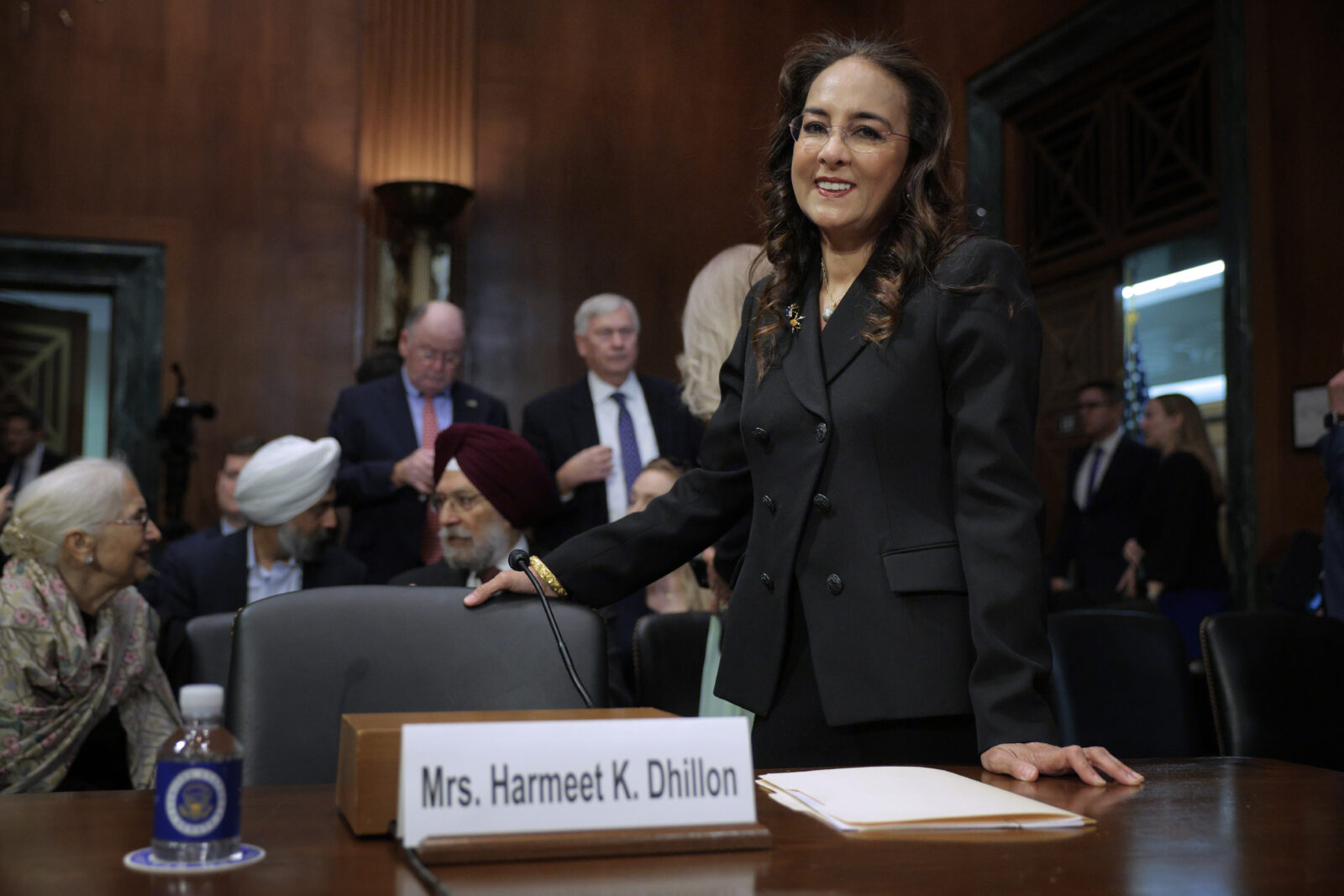
Chip Somodevilla/Getty Images
Harmeet Dhillon says DOJ will fight antisemitism through law, not speech codes
In an interview with JI, the senior DOJ official said that while combating antisemitism is a priority, the Justice Department is focused on the Trump administration’s battle with DEI
When Harmeet Dhillon started her role as assistant attorney general for civil rights at the Justice Department in April, she refocused the division’s priorities to explicitly follow the aims of President Donald Trump: rooting out antisemitism, eradicating diversity, equity and inclusion programs and ending the participation of transgender athletes in women’s sports.
The move was met with controversy among the civil rights division’s staff, many of whom are civil servants, not political appointees. About half of the division’s lawyers have quit since she was sworn in.
But while Dhillon, a Republican operative and civil rights attorney from San Francisco, is committed to rigorously carrying out Trump’s agenda, she is attempting to do so while also remaining committed to protecting free speech. In an interview at the Justice Department on Thursday, Dhillon told Jewish Insider that she does not intend to crack down on free speech despite the prevalence of antisemitism at American universities — a position that she said diverged from what some members of Congress and Jewish activists have asked of her.
“People in the Jewish community have pressured me to issue guidance to outlaw certain kinds of speech on the campus, and I haven’t gone that far. I don’t think that’s appropriate,” Dhillon said on Thursday in her office. “I think that you can criticize Israel. Many Jews criticize Israel. You can criticize the United States’ role. You can support the aspirations of the Palestinian people. You can even support Hamas, to a degree.”
Unless, she noted, the person who is espousing support for Hamas is an international student. “If you’re here as a foreign student and you’re supporting terrorism or what happened on Oct. 7, you may not be entitled to stay in this country. So those are all personal choices people are making, and those personal choices have consequences,” said Dhillon.
As a partner at her own law firm, Dhillon took on several notable cases representing conservative clients who felt their rights had been trampled in liberal jurisdictions. In 2017, she sued the University of California, Berkeley, on First Amendment grounds, on behalf of the Berkeley College Republicans after a speaker the group brought to campus was canceled by the university. She filed numerous lawsuits in 2020 challenging California’s COVID-19 policies. In 2023, her firm filed a case on behalf of a person who sought to reverse their gender transition.
A former board member of the northern California chapter of the American Civil Liberties Union, Dhillon outlined her approach to determining when free speech crosses the line into unlawful behavior.
“I am a firm believer in free speech, and I think the way I see it on a campus setting is that a campus is not just an ‘open free speech’ zone,” Dhillon explained. “Where someone’s so-called free speech is obstructing the main purpose of the facility or the area, and obstructing the right of students and employees of the university to be able to get to their classes, teach their classes, enjoy their classes, or there’s a level of othering and obstruction and picketing and misery that makes it impossible for people to enjoy a peaceful educational setting — that’s where it becomes problematic.”
It’s the onus of the universities to “police this,” she said, because they receive federal funding.
“It’s complicated, and so each case is different,” said Dhillon. “You have to do the analysis of where this is and where it’s happening. Blocking access to a dormitory — that’s not a limited purpose public forum. It’s a private space, actually, so you don’t have the same free speech rights there as you do on the college green.”
While antisemitism has factored heavily in the Justice Department’s work in recent months, Dhillon said it is secondary to DEI in terms of the extent of each problem.
“Antisemitism is just one of the many issues. DEI is a bigger issue. There’s sports issues, Title IX issues, women’s privacy issues,” said Dhillon. “You don’t see antisemitism at every school. You see DEI at every school.”
Trump administration officials and other opponents of DEI argue that diversity, equity and inclusion programs promote discrimination by prioritizing identity over merit, while critics of that view say eliminating them will roll back decades of progress on equal opportunity. DEI initiatives, which expanded rapidly in universities and corporations after the George Floyd protests and the rise of the Black Lives Matter movement, have recently faced pushback and retrenchment — as institutions from the federal government to major companies and universities scale back their programs.
Much of the department’s work under Dhillon has centered on conservative priorities and targeted left-wing causes. That doesn’t mean the DOJ is ignoring antisemitism from the right, said Dhillon, noting she does “not apply a political lens to our work.” But she is not worried about harmful speech alone.
“Where protesters have blocked access to Hillel or Chabad on campuses, those are FACE Act cases. People need to bring me the facts, and we will work them up and see if we can bring a prosecution on those cases, civil or criminal,” Dhillon said.
“I see a lot of noise online. I see some conservative commentators, including some people who’ve been friends of mine or I agreed with in the past, taking some radical views on some of these issues. And I mean, okay, the marketplace of free ideas in America means I don’t have to follow them or listen to them,” she said. “It’s disturbing, but that’s free speech. So the antidote to speech we don’t like in America is more speech. [But] where you’re talking about somebody attacking a house of worship, attacking people of the Jewish faith because of their faith or because of their support of the victims of Oct. 7, those are hate crimes, and that’s what we deal with.”
The Justice Department filed a lawsuit in September against anti-Israel protesters who demonstrated outside a New Jersey synagogue, alleging their actions were meant to keep congregants from exercising their religion. The suit relied on the FACE Act, a Clinton-era statute that has typically been applied to violent protesters outside abortion clinics, but which also has a provision about houses of worship. Dhillon intends to file more cases in that vein.
“Where protesters have blocked access to Hillel or Chabad on campuses, those are FACE Act cases. People need to bring me the facts, and we will work them up and see if we can bring a prosecution on those cases, civil or criminal,” she said.
While the department does research into which cases to bring, Dhillon said her team acts “as almost a customer-service bureau, if you will, to complaints from the public.” Some of it comes across her desk online. She is active on X, where she regularly responds to news stories and commentary. “Not good,” she wrote on Tuesday in response to a post from a Seattle talk radio host who was calling attention to DEI programs at the University of Washington.
At the heart of the Trump administration’s aggressive approach is a willingness to demand that all entities that receive federal funding — nearly every university in America, as well as many municipalities, school districts and more — are committed to upholding civil rights in the way the administration has interpreted that pillar of American democracy.
“We’re not in the business of micromanaging universities. We’re in the business of ensuring that our federal civil rights laws are being followed,” Dhillon said. “We have the right, as the DOJ, under this agreement [with UVA], to go back in immediately and open up new investigations if the facts merit that.”
The result has been the withholding of billions of dollars of funds from several prominent universities and, more recently, settlements with a number of those schools, including Columbia, Brown and, this week, the University of Virginia.
That’s a function that in the past may have been reserved for the Education Department. But with Trump’s desire to eliminate the Education Department entirely, more of those responsibilities now fall under Dhillon’s purview. Despite the heavy-handed approach, Dhillon said the government mostly intends to leave implementation of the agreements up to the schools, so long as they know they are not off the hook for future violations.
“We’re not in the business of micromanaging universities. We’re in the business of ensuring that our federal civil rights laws are being followed,” Dhillon said. “We have the right, as the DOJ, under this agreement [with UVA], to go back in immediately and open up new investigations if the facts merit that.”
That threat of legal action has led to change on college campuses, Dhillon said.
“That’s the effect of a watchdog, aggressive DOJ, and it has been very effective so far,” said Dhillon. “I don’t think any school in America thinks they can get away with discriminating against Jews and not letting them get to class without seeing a tweet from me followed by a lawsuit from me.”






